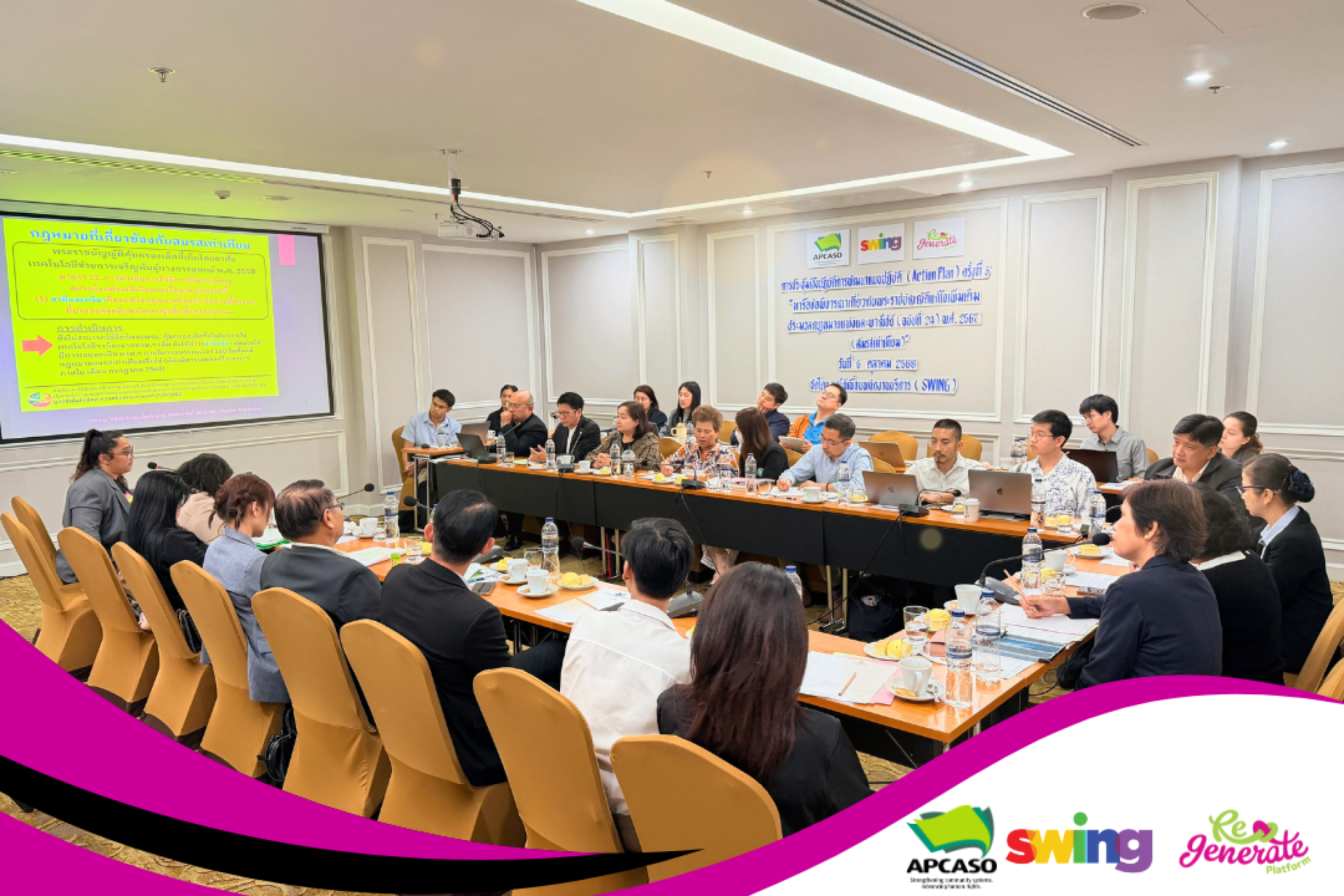ChatGPT said: Gender Justice & Sexual Rights: Thailand’s Step to Equality
Last updated: 8 Oct 2025
30 Views

Background and Context
The Gender Justice and Sexual Rights Initiative is a regional collaboration aimed at addressing long-term structural gaps in gender and sexual rights within health policies and services particularly in the areas of HIV, tuberculosis, and malaria across the Asia-Pacific region.
In Thailand, the project is implemented by the Service Workers in Group Foundation (SWING Foundation), an organization with more than 20 years of experience advancing human rights, HIV prevention, and health equity among men who have sex with men (MSM), transgender people, sex workers, and young key populations.
Support from Linitiative and Expertise France has enabled SWING to develop innovative approaches that link public health with human rights and gender equality, creating a foundation for sustainable policy change at the national level.
Objectives and Goals
The projects main goal is to promote and advocate for HIV, TB, and malaria policies that are inclusive and responsive to the specific needs of women, girls, and people of diverse gender identities in Thailand.
Its three key objectives are to:
Strengthen civil society and community participation in promoting gender justice and sexual rights.
Enhance the capacity of community organizations to influence and advocate for gender-responsive health policies.
Establish monitoring and evaluation systems that reflect the real-world situation of gender equality in health contexts.
2025 Implementation: From Evidence to Policy Action
Throughout 2025, the project has initiated several critical processes, including:
Establishing a National Advisory Committee on Gender Justice and Sexual Rights in Health
Bringing together academics, civil society, and community representatives to develop a unified policy direction.
Developing a National Situation Report on Gender Justice in Health
Gathering evidence from key populations including MSM, transgender people, sex workers, youth, and women affected by health inequities to identify structural barriers and legal gaps.
Drafting a National Action Plan
Outlining strategies for integrating gender justice into Thailands health systems and ensuring inclusive service delivery.
Designing Monitoring and Evaluation Tools
To track progress, measure outcomes, and assess the effectiveness of gender equalityrelated policies.
Policy Landscape: Gaps, Inequalities, and Reform Directions
While the 2017 Constitution of the Kingdom of Thailand guarantees equality and prohibits discrimination including on the basis of sex Thailands legal framework still largely operates under a binary malefemale system, leaving many gender-diverse individuals inadequately protected.
Examples include:
The Gender Equality Act (2015), which promotes non-discrimination but still faces systemic implementation gaps.
Transgender individuals remain unable to change gender titles in official documents, leading to widespread discrimination in education, employment, and healthcare.
Sex work remains criminalized, exposing sex workers to legal risks, social stigma, and health vulnerabilities.
Migrant sex workers continue to face barriers to healthcare and legal protection.
Nevertheless, Thailand has made historic progress with the recent Marriage Equality Bill, granting same-sex couples equal rights in inheritance, medical decision-making, and child adoption positioning the country as a regional leader in LGBTQI+ rights.
Additionally, the draft Anti-Discrimination Bill, currently under consideration, represents a vital step toward stronger protection for women, ethnic minorities, LGBTQI+ persons, and people living with HIV promoting equal access to employment, healthcare, and social services while upholding dignity and inclusion.
SWING Foundations Role: From Service Provision to Policy Advocacy
Drawing on years of community-based work, SWING recognizes that health cannot be separated from human rights and dignity. Sustainable access to HIV and sexual health services for MSM, transgender people, sex workers, and youth cannot be achieved without dismantling discriminatory social and legal structures.
SWING therefore acts as a bridge between communities and policymakers by:
Elevating the voices of those most affected at the community level.
Translating lived experiences into evidence-based policy recommendations.
Building multi-sectoral collaboration among government agencies, private sectors, and international partners.
The Way Forward: Gender Justice as the Foundation of Sustainable Society
The Gender Justice and Sexual Rights Initiative represents a transformative step toward building a society that truly leaves no one behind.
With the ongoing support of Linitiative and Expertise France, SWING Foundation is committed to:
Empowering civil society to play a stronger role in national policy dialogues.
Expanding learning and collaboration across the Asia-Pacific region.
Advancing health equity for all, regardless of gender, sexuality, or social status.
Because gender justice is not an issue for one group alone it is the foundation of a society rooted in dignity, equality, and sustainability for everyone.
SWING Foundation
Advancing Gender Equality and Health Rights in Thailand
www.swingthailand.org
The Gender Justice and Sexual Rights Initiative is a regional collaboration aimed at addressing long-term structural gaps in gender and sexual rights within health policies and services particularly in the areas of HIV, tuberculosis, and malaria across the Asia-Pacific region.
In Thailand, the project is implemented by the Service Workers in Group Foundation (SWING Foundation), an organization with more than 20 years of experience advancing human rights, HIV prevention, and health equity among men who have sex with men (MSM), transgender people, sex workers, and young key populations.
Support from Linitiative and Expertise France has enabled SWING to develop innovative approaches that link public health with human rights and gender equality, creating a foundation for sustainable policy change at the national level.
Objectives and Goals
The projects main goal is to promote and advocate for HIV, TB, and malaria policies that are inclusive and responsive to the specific needs of women, girls, and people of diverse gender identities in Thailand.
Its three key objectives are to:
Strengthen civil society and community participation in promoting gender justice and sexual rights.
Enhance the capacity of community organizations to influence and advocate for gender-responsive health policies.
Establish monitoring and evaluation systems that reflect the real-world situation of gender equality in health contexts.
2025 Implementation: From Evidence to Policy Action
Throughout 2025, the project has initiated several critical processes, including:
Establishing a National Advisory Committee on Gender Justice and Sexual Rights in Health
Bringing together academics, civil society, and community representatives to develop a unified policy direction.
Developing a National Situation Report on Gender Justice in Health
Gathering evidence from key populations including MSM, transgender people, sex workers, youth, and women affected by health inequities to identify structural barriers and legal gaps.
Drafting a National Action Plan
Outlining strategies for integrating gender justice into Thailands health systems and ensuring inclusive service delivery.
Designing Monitoring and Evaluation Tools
To track progress, measure outcomes, and assess the effectiveness of gender equalityrelated policies.
Policy Landscape: Gaps, Inequalities, and Reform Directions
While the 2017 Constitution of the Kingdom of Thailand guarantees equality and prohibits discrimination including on the basis of sex Thailands legal framework still largely operates under a binary malefemale system, leaving many gender-diverse individuals inadequately protected.
Examples include:
The Gender Equality Act (2015), which promotes non-discrimination but still faces systemic implementation gaps.
Transgender individuals remain unable to change gender titles in official documents, leading to widespread discrimination in education, employment, and healthcare.
Sex work remains criminalized, exposing sex workers to legal risks, social stigma, and health vulnerabilities.
Migrant sex workers continue to face barriers to healthcare and legal protection.
Nevertheless, Thailand has made historic progress with the recent Marriage Equality Bill, granting same-sex couples equal rights in inheritance, medical decision-making, and child adoption positioning the country as a regional leader in LGBTQI+ rights.
Additionally, the draft Anti-Discrimination Bill, currently under consideration, represents a vital step toward stronger protection for women, ethnic minorities, LGBTQI+ persons, and people living with HIV promoting equal access to employment, healthcare, and social services while upholding dignity and inclusion.
SWING Foundations Role: From Service Provision to Policy Advocacy
Drawing on years of community-based work, SWING recognizes that health cannot be separated from human rights and dignity. Sustainable access to HIV and sexual health services for MSM, transgender people, sex workers, and youth cannot be achieved without dismantling discriminatory social and legal structures.
SWING therefore acts as a bridge between communities and policymakers by:
Elevating the voices of those most affected at the community level.
Translating lived experiences into evidence-based policy recommendations.
Building multi-sectoral collaboration among government agencies, private sectors, and international partners.
The Way Forward: Gender Justice as the Foundation of Sustainable Society
The Gender Justice and Sexual Rights Initiative represents a transformative step toward building a society that truly leaves no one behind.
With the ongoing support of Linitiative and Expertise France, SWING Foundation is committed to:
Empowering civil society to play a stronger role in national policy dialogues.
Expanding learning and collaboration across the Asia-Pacific region.
Advancing health equity for all, regardless of gender, sexuality, or social status.
Because gender justice is not an issue for one group alone it is the foundation of a society rooted in dignity, equality, and sustainability for everyone.
SWING Foundation
Advancing Gender Equality and Health Rights in Thailand
www.swingthailand.org
Tags :
Related Content
Over 13,000 Signatures Submitted to Draft Bill Repealing Prostitution Law: Ending Discrimination, Upholding Dignity, and Ensuring Equal Rights.
On February 6, 2025, at the Parliament, Khun. Naiyana Supapueng, a representative from the Service Workers in Group Foundation (SWING, Thailand), along with her team, submitted a draft bill to repeal the Prevention and Suppression of Prostitution Act B.E. 2539 (1996), accompanied by over 13,000 supporting signatures. The draft was presented to Khun. Wan Muhammad Normatha, Speaker of the House of Representatives, with Khun. Kampee Disthakorn, the Speakers spokesperson, receiving it on his behalf.
17 Feb 2025
The 6th Annual Arthanareeswara Awards Ceremony, 2024
The National and International Awards for Sexual Diversity were established to honor individuals, agencies, and organizations dedicated to promoting the well-being and human rights of people with diverse sexual orientations and identities.
Khun Surang Janyam received the award in the Individual Category for her contributions to enhancing the resilience and potential of sexually diverse communities.
23 Dec 2024


